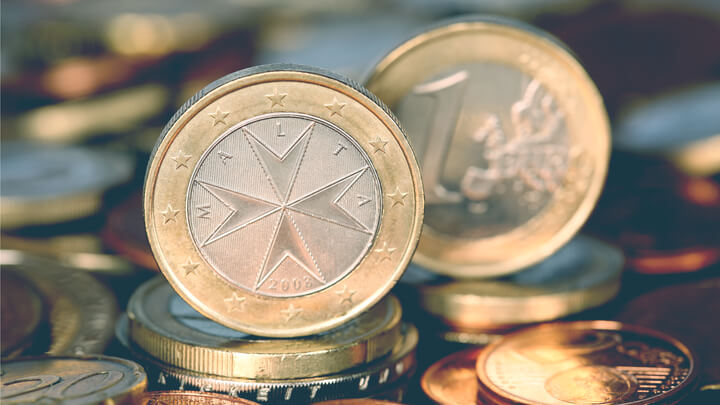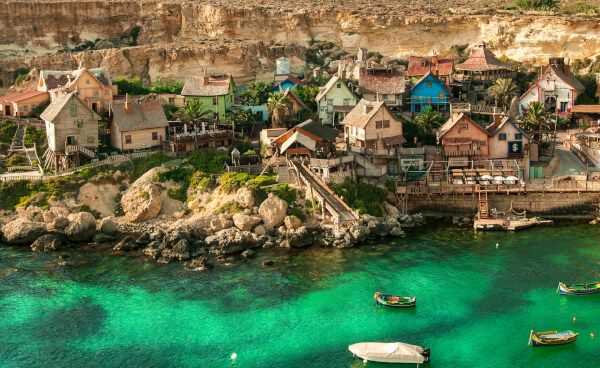Is it better to use cash or card in Malta?
Should you pay with cash or card in Malta? A handy guide including cash etiquette, Maltese ATMs and using your UK card.

Malta only has around 500,000 residents, but yet sees over 1.7 million visitors every year. From its ancient temples to crystal clear snorkelling to dazzling palaces, churches and museums, Malta has a lot to offer. Not to mention their great climate, friendly welcome and buzzing bar scene. No wonder so many people visit.
Regardless of whether you’re just visiting or will be in Malta for the long-term, everything still costs. So if you’re planning a trip, you’ll need some cash in your pocket to make the most of it.
This guide is here to help. You can find everything you need to know about the currency and banking systems in Malta so you can focus on preparing for your trip.
Prior to 2008, Malta used the Maltese Lira. However, these days, the official currency of Malta is the euro.
Because Malta welcomes tourists from all over the world, you’ll find that some large hotels and tourist attractions will accept payments in other international currencies. However, the rates are likely to be poor, and you may not be given change. Unless you're desperate, exchanging your cash from home and using euros to fund your trip is a far better choice.
| Euro Symbols | EUR, € |
|---|---|
| 1 EUR | One euro is made up of 100 cents. |
| EUR coins | Coins are available in denominations of 1, 2, 5, 10, 20, and 50 cents, as well as €1 and €2. |
| EUR banknotes | Commonly used banknotes are 5, 10, 20 and 50 euro denominations. Although €100, €200 and €500 bills are also available, they won’t be accepted by many businesses. |
All current euro coins and bills can be used in any country in the Eurozone block. You will find, however, that coins of the same denomination have different images on them. That’s because each member state mints coins with their own choice of design on one side. The banknotes, however, are the same wherever they're printed.
Because the euro is so widely traded, it’s possible to find good deals on currency exchange more or less anywhere in the world. Therefore, if you're prepared to shop around, you can buy your euros at home, or once you arrive, according to your personal preference.
It’s worth knowing that the exchange rates available at airports are seldom good. Frequent visitors to Malta specifically warn against buying too much currency at the airport. If you do find that you need cash when you arrive, exchange only a small amount and then seek a better deal elsewhere. Otherwise, consider using an ATM to withdraw euros directly at a reasonable rate. More on that later.
When you're looking for the best deal on currency exchange, head into the centre of the town where competition will drive a better deal for customers. Where there’s a captive market, in your hotel, for example, it’s very likely that exchange rates will be poor and include high fees.
When you change your cash, remember that even the exchanges which claim ‘Zero Commission’, aren't working for free. They simply wrap up their profit into the poorer exchange rate they offer to customers.
The best way to make sure you get a fair deal is to understand the mid-market rate. The mid market rate changes minute-by-minute and is the exchange rate that banks use to trade cash between themselves on the global market. It’s also what exchanges are based on all over the world. You can get access to the live mid market rate for your currency and euros by using a currency converter online.
Once you find out what the mid-market exchange rate is, compare this to the rate that the exchange service is offering you. The difference, plus any extra fees, is the real cost of your currency exchange.
If you're changing hard cash in Malta, it’s good to know that the banknotes you bring should be in perfect condition. Any that are ripped or marked might be refused by the exchange desk.
Traveller’s Cheques are fast becoming obsolete. If you try to use them in Malta, you’ll find that only a limited number of exchange services will deal with them. Rates and fees are likely to be fairly high and they are rarely accepted as direct payment.
All in all, many travellers are abandoning this means of payment in favour of a mix of credit/debit cards, ATM withdrawals and old-fashioned cash.
Credit and debit cards are widely accepted in Malta, although American Express will sometimes be refused because of the relatively high fees they impose on retailers.
It's worth carrying some local cash, just in case you run into a problem.
If you're travelling, then it’s a good idea to let your bank know your plans in advance. If you don’t, you might find that their anti-fraud software blocks your card when ‘unusual’ transactions show up.
Using cards to fund your trip is a good option for many travellers - as long as you avoid something called Dynamic Currency Conversion (DCC).
With DCC, when you pay by credit/debit card, you can choose the ‘option’ to see the cost shown in your home currency. You’ll be asked by the retailer if you want to be charged in your home currency - but the smart answer is always no. Though DCC definitely seems much more comfortable (it’s always easier to understand our own currency), unfortunately there are more downsides than up.
When you accept the DCC, it means that the local card provider will make the exchange between euros and your home currency (almost always with a poor rate) in addition to any fees they may charge you for this ‘service’. If you decline the option, then your home bank will give you the exchange rate - which should be much more favourable. When you’re abroad, always select to pay in the local currency (EUR) to get a better exchange rate.
Malta has an extensive network of ATMs. Use one of the locator tools below to find one in your network. Malta’s Bank of Valletta even offer a couple of ‘Drive Through’ ATMs, if you’re in the right neighbourhood.
Visa ATM locator
MasterCard ATM locator
Amex ATM locator
When you use an ATM to withdraw cash abroad, you’ll usually be charged by both your home bank and the ATM provider. Despite this, it’s still often an economical way to get currency when you travel, because the exchange rate applied tends to be good.
Before you travel, it’s also worth asking your home bank if they work in partnership with any banks in Malta. If they do, you might find that you get free or reduced fee access to ATMs when you're there, as long as you use the partner bank’s services.
The only thing you must be wary of - if you want a good deal - is DCC (explained in the previous section). The ATM might ask if you want to be charged for your withdrawal in your home currency. As with card payments, this means you lose control of the exchange rate used (which won't work out in your favour). Always select to be charged in local currency, not your home currency, when withdrawing money.
The banking system in Malta is broad and sophisticated. As well as having retail banks which serve the local population, Malta is positioning itself as an international finance hub. This means that there are many international banks operating here, offering investment and wealth management services.
Alternatively, for simple access to your money abroad - and an even better deal - use Wise.
If you or a friend have a bank account in Malta, you can transfer money between accounts using the real mid-market exchange rate. With a fair rate and low fee, it's a convenient way to get your cash, with no nasty surprises.
*Please see terms of use and product availability for your region or visit Wise fees and pricing for the most up to date pricing and fee information.
This publication is provided for general information purposes and does not constitute legal, tax or other professional advice from Wise Payments Limited or its subsidiaries and its affiliates, and it is not intended as a substitute for obtaining advice from a financial advisor or any other professional.
We make no representations, warranties or guarantees, whether expressed or implied, that the content in the publication is accurate, complete or up to date.

Should you pay with cash or card in Malta? A handy guide including cash etiquette, Maltese ATMs and using your UK card.

This article gets you one step closer to your affordable vacation in Malta by detailing your options for VAT refund in Malta as a tourist.

Malta may be small, but it’s a fascinating place, packing in a whole load of history, culture, nature and a cool city vibe. Popular for holidays, it’s not...